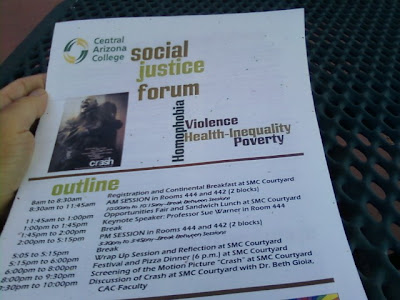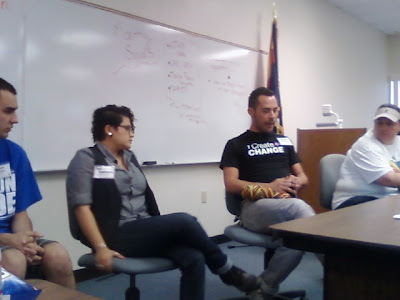
APACHE JUNCTION, Ariz., Apr. 5 -
The Pinal County Greens today attended the Social Justice Forum at Central Arizona College. Here is a report by Pinal County Greens co-chair Richard Grayson:
We spent most of the day today at an innovative and informative Social Justice Forum sponsored by Central Arizona College at its Superstition Mountain Campus in Apache Junction. The Social Justice Forum drew its inspiration in part from the well-known words of Martin Luther King Jr. wrote in his "Letter from Birmingham Jail": "Injustice anywhere is a threat to justice everywhere,"
and it included a terrific keynote address by Dr. Sue Warner, numerous concurrent presentations and sessions on different topics related to the forum's theme, an opportunity fair, discussions about community activism, a film showing, and more (also breakfast and lunch), all for a nominal $10 fee.
The concurrent sessions were held in rooms 442 and 444 on campus, and while everyone had to choose one of two or three during the four blocks of time from 8:30 am to 5:00 pm, we got to attend some interesting presentations, starting with attorney Leo Valverde's "The New Face of Poverty" to start.
Leticia Berry, a CAC student who works at the Desert Vista Behavioral Health Hospital and at Parc Place Chandler, an adolescent inpatient treatment facility, delivered a highly informative presentation on the etiology and behavioral symptoms of juvenile sex offenders, their treatment, and how parents can protect their own children.
Another great session featured Dr. Kristen Bishop, a naturopathic medical doctor, leading a discussion on important women's health issues regarding pregnancy and birth -- as a doula, she contrasted various methods of natural childbirth with standardized U.S. hospital births -- and the factors affecting breastfeeding. We've been interested in women's medical care since being involved in an undergraduate campaign to get a gynecologist on the Brooklyn College campus and doing our political science major's seminar paper on the changes going on in reproductive health care back in the early 1970s, and we learned a lot from Dr. Bishop.
At 1 p.m., after lunch and an opportunity fair in which various local organizations of activists from places like the food bank set up tables in the courtyard, we got to hear Dr. Sue Warner, Central Arizona College's chair of Social and Behavioral Sciences, deliver a wide-ranging keynote address titled "The Broken Escalator."
The title came from a video she showed near the end of her presentation, a compendium of varied social justice issues facing the world today, from income and wealth inequality to demonization of "the other" to environmental justice.
As someone who's taught at colleges, law schools and high schools since 1975, we can always recognize a highly effective, inspiring teacher, and Dr. Warner did not merely lecture but skillfully engaged the audience in a thoughtful and provocative discussion.
One of several sessions concerned with LGBT issues -- we missed ones on bullied youth and coming out, affirming churches, and sensitivity training for parents, but we figured that having been active in gay rights for decades, we could learn more at other sessions on less familiar topics -- was a highly interactive presentation and discussion, "Equal Rights: A Call to Action," led by Stacey Jay Cavaliere and Bea Valezquez of One in Ten, an organization we've long admired.
They were master facilitators, funny and warm and intelligent and informative, and they made effective use of group activities, like our discussion using yarn, which effectively tied all the individuals in a varied group together.
A lighter but fascinating change of pace was CAC student Brittni Evans' presentation, "Star Trek: Adventures through Space and Equality," focusing on the social justice issues and messages of equality and inclusion that permeated Gene Roddenberry's original 1960s Star Trek series. (We remember our Midwood High School classmate Neil giving us a petition to sign in the spring of 1967 to stop NBC from canceling it after the first, low-ratings season. It worked, and the show lived long and prospered.)
Another CAC honors student, Jo Beaudry, then spoke on "The Psychology of Hate: Cognitive and Psycho-Sociological Effects of Hate Regarding the LGBTQ Community," a sophisticated presentation involving brain science and cognitive behavior therapy. It was very well-done. We should note that the technology so helpful in these presentations worked pretty flawlessly -- as a college instructor, we know how rare that can be -- thanks to, we think, Cristina Hatler, Melissa Gardner and others involved in the planning for this terrific event.
We had to get to the nursing home to help feed our mom dinner and then do some other work, and so we missed the pizza dinner on campus and the courtyard 8 p.m. screening of Paul Haggis' Oscar-winning film Crash and the discussion afterward. We've seen it a couple of times, first in 2004 in a Plantation, Florida, theater and can see how the movie's L.A.-based interwoven narrative works effectively as a critical reflection instructional tool for diversity and social justice issues dealing with race, gender, and ethnicity.
Speaking of L.A.: although we missed Hanukkah in Santa Monica in December, we're about to head out to spend Pesach in the San Fernando Valley. But we are grateful for everyone involved in making today's Social Justice Forum at Central Arizona College's Superstition Mountain Campus a reminder to us that we don't have to be in New York City, Los Angeles or Miami to find a community concerned with the issues we've been involved with our whole lives.












